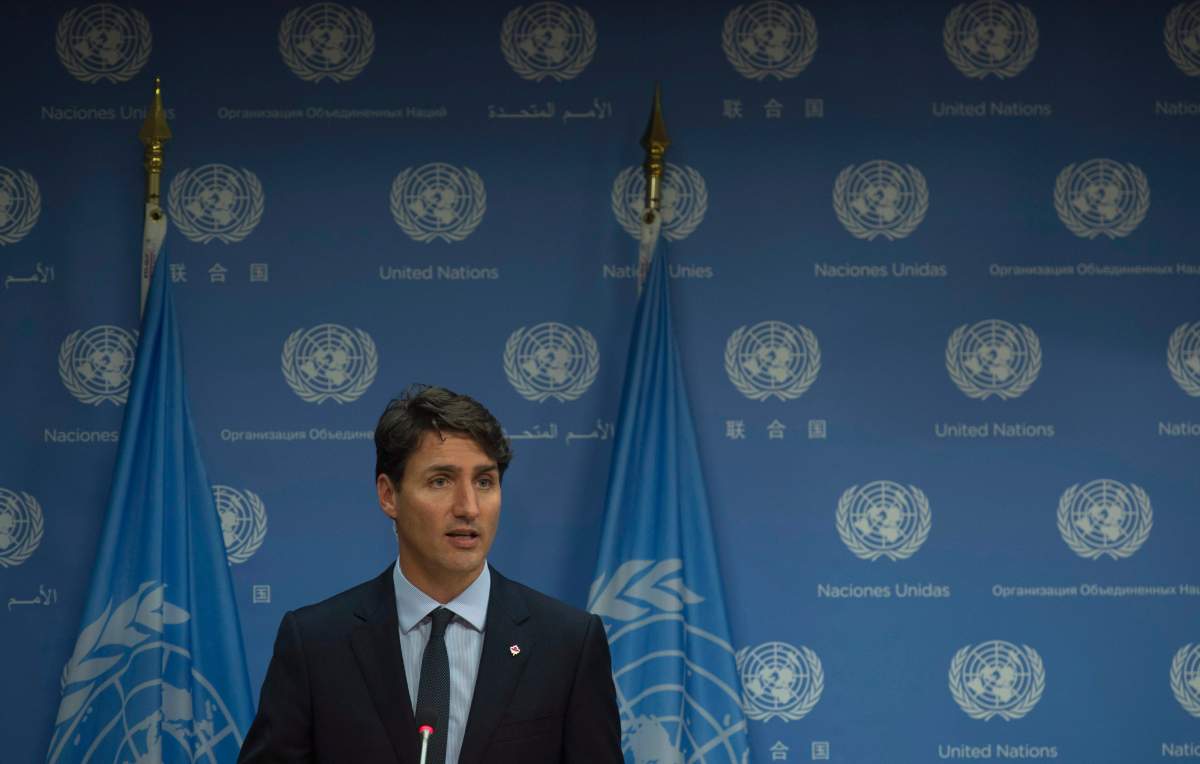Very few Canadians likely recall the outcome of the 2010 UN Security Council vote, let alone spend much time dwelling on it. Moreover, it’s unlikely any future historians will marvel at the ascendancy of Portugal to the world stage in the ensuing decade.

Yet, Prime Minister Justin Trudeau would have us all believe that Canada losing out to Portugal seven years ago represented some sort of calamity for Canada’s position on the international stage and that we must strive to rectify this blight by prevailing over either Norway or Ireland for one of two open seats in 2021.
It’s far from clear, though, why this should matter to Canadians. That’s not to say that our international stature and reputation don’t matter to Canadians, but it’s not something to be measured by our ability to horse-trade and pander at the United Nations.
Trudeau’s address to the UN General Assembly in New York didn’t mention our Security Council campaign, but he emphasized its importance at a separate news conference. According to Trudeau, not only do “Canadians benefit when we have a time on the Security Council,” but that “the world benefits when Canada has a voice on the Security Council.”
This is the sort of syrupy rhetoric we’ve become used to from this prime minister, but it’s largely meaningless. Trudeau’s examples of how Canada is “re-engaged” in global affairs and offering an “important voice” included our involvement in the anti-ISIS mission in northern Iraq and our commitment to defending our NATO allies. Those are great examples of meaningful international engagement, but they have little to do with the United Nations.
If we’re going to tout the supposed prestige of holding a non-permanent seat on the UN Security Council, the names of the ten countries currently holding those seats provide some necessary context. Nothing against Bolivia, Ethiopia, Kazakhstan, Senegal, or Uruguay, but you’d be hard-pressed to argue that these nations carry a disproportionate amount of international sway or that they’re at the forefront of critical multilateral initiatives.

Get daily National news
There is also a financial cost to pursuing a Security Council seat. Even the government’s own numbers indicate that over half a million dollars has been spent on the campaign, but that does not appear to include the cost of the government workers who have been tasked with working full-time on this bid.
Beyond the financial costs, though, what are we willing to compromise on in order to secure this seat? The Conservatives have long maintained that Canada lost out in 2010 because they were willing to take firm stands on such issues as support for Israel, opposition to anti-gay laws in Africa, and human rights violations in other countries.
It’s hard to know for sure to what extent that factored in, but one can’t deny the obvious fact that countries offended by our foreign policy stances are unlikely to vote for us in such a contest. So are we shaping our foreign policy around Canadian principles and values or are we pulling our punches so as to not alienate key UN votes?
Moreover, the charm offensive necessary to execute a successful campaign would also likely exclude us from calling out the shortcomings of the UN itself. It would be much preferable to push for UN reform at the expense of a Security Council seat than to win the seat and allow the status quo to prevail.
Remember, this is the same United Nations that allowed Saudi Arabia to be elected to the UN Commission on the Status of Women earlier this year. Two years ago the same oppressive Saudi regime was elected chair of a key UN Human Rights Council panel. This is the sort of thing that needs to be denounced, not ignored in pursuit of political goals.
There are more important and consequential ways of engaging on the world stage, and that’s where the Trudeau government’s focus needs to be. This campaign isn’t worth it.
Rob Breakenridge is host of “Afternoons with Rob Breakenridge” on Calgary’s NewsTalk 770 and a commentator for Global News.















Comments
Want to discuss? Please read our Commenting Policy first.